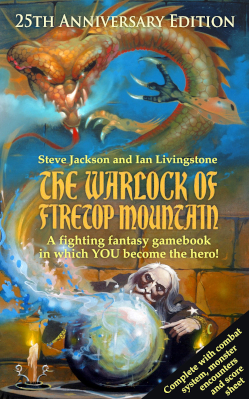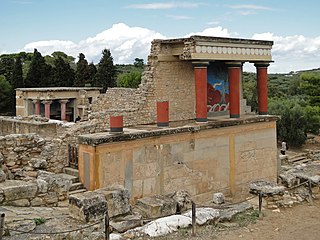Story
The reader controls Altheus, brother of the legendary hero Theseus, who in this series was killed in his quest to slay the Minotaur of Crete (in the original myth Theseus was victorious over the Minotaur, and Altheus does not appear). Told of this state of affairs by the messenger god Hermes, Altheus embarks on a mission of vengeance.
In Bloodfeud of Altheus, the young hero chooses a patron god from among six of the Olympians (Athena, Ares, Hera, Aphrodite, Apollo or Poseidon), and sets out for Athens to meet with his father, King Aegeus, then to gain passage to Crete. The book ends when Altheus's ship manages to get past Talos, the bronze giant, and arrives in Crete.
In the next book, At the Court of King Minos, Altheus has arrived on Crete and must deal with the members of Minos's court while trying to enter the labyrinth beneath Minos's palace and succeed where his brother failed. After killing the Minotaur, Altheus escapes from the palace and sails away with the king's daughter, Ariadne.
In the final book, Return of the Wanderer, Altheus is condemned by the gods to wander in search of redemption for sins he has committed against Ariadne.
Details
Each book is set in the mythological world of Ancient Greece. The series incorporates a set of characteristics differing from the Fighting Fantasy series, including combat statistics Might and Protection, and Honour and Shame ratings. Might is "a combination of [Altheus's] natural ability and the value of the strongest weapon he is carrying", while Protection is a combination of "inborn skill at dodging and the sum total of the armour he happens to be wearing". Honour is gained by victory in combat, and may be used up in appeals to the gods or to gain a temporary increase in Might or Protection in combat. Shame cannot be eradicated once acquired, and "is accumulated by such cultural faux pas as slaying one's opponent after he has surrendered, or failing to perform heroic deeds". If Altheus ever accumulates more Shame than Honour, he will be "overwhelmed by the burden of his heroic conscience" and kill himself on the spot.
Altheus chooses a patron deity at the start of Bloodfeud of Altheus, but also maintains standings with other gods, being either in Favour, Neutral, or in Disfavour with each deity. Actions appeasing or angering the gods may change these ratings, and in turn the ratings determine how the gods react to and assist Altheus at various points in the story. Certain patrons give particular benefits - for example Ares gives a bonus in battle.
Another difference from the Fighting Fantasy books is the way that the protagonist's health is represented. Instead of having a stamina attribute which decreases as the character is injured, there are four simple stages to measure health: healthy, wounded, seriously wounded and dead. These are automatically reset after a battle. While seriously wounded a combatant is only allowed to add the roll of one die to their Might instead of two to reflect their weakened state.
The books have around 500–600 paragraphs and are therefore slightly longer than the standard Fighting Fantasy books. They are also physically larger, and similarly sized to Steve Jackson's Sorcery! series.
The Cretan Chronicles also use a unique system known as "Taking a Hint". At times the reader may want to perform non-standard actions. These are not offered in the text, but are available when the paragraph number is in italic type, by adding 20 to the paragraph number. If there is no non-standard action at that point which a Bronze-Age hero would have thought of, the reader pays a penalty in either Honour or Shame (or both), for trying to be ahead of his time. (If a player's patron is Athena, the penalty is only to honour, never shame; if it's Apollo, god of prophecy, no penalty applies.)

In Greek mythology, Daedalus was a skillful architect and craftsman, seen as a symbol of wisdom, knowledge and power. He is the father of Icarus, the uncle of Perdix, and possibly also the father of Iapyx. Among his most famous creations are the wooden cow for Pasiphaë, the Labyrinth for King Minos of Crete which imprisoned the Minotaur, and wings that he and his son Icarus used to attempt to escape Crete. It was during this escape that Icarus did not heed his father's warnings and flew too close to the sun; the wax holding his wings together melted and Icarus fell to his death.

In Greek mythology, the Minotaur is a mythical creature portrayed during classical antiquity with the head and tail of a bull and the body of a man or, as described by Roman poet Ovid, a being "part man and part bull". He dwelt at the center of the Labyrinth, which was an elaborate maze-like construction designed by the architect Daedalus and his son Icarus, on the command of King Minos of Crete. The Minotaur was eventually killed by the Athenian hero Theseus.

In Greek mythology, Minos was a King of Crete, son of Zeus and Europa. Every nine years, he made King Aegeus pick seven young boys and seven young girls to be sent to Daedalus's creation, the labyrinth, to be eaten by the Minotaur. After his death, King Minos became a judge of the dead in the underworld.

In ancient Greek religion and Greek mythology, Pasiphaë was a queen of Crete, and was often referred to as goddess of witchcraft and sorcery. The daughter of Helios and the Oceanid nymph Perse, Pasiphaë is notable as the mother of the Minotaur. She conceived the Minotaur after mating with the Cretan Bull while hidden within a hollow cow that the Athenian inventor Daedalus built for her, after Poseidon cursed her to fall in love with the bull, due to her husband, Minos, failing to sacrifice the bull to Poseidon as he had promised.

Theseus was a divine hero and the founder of Athens from Greek mythology. The myths surrounding Theseus, his journeys, exploits, and friends, have provided material for storytelling throughout the ages.

Fighting Fantasy is a series of single-player role-playing gamebooks created by Steve Jackson and Ian Livingstone. The first volume in the series was published in paperback by Puffin in 1982.

In Greek mythology, Rhadamanthus or Rhadamanthys was a wise king of Crete. As the son of Zeus and Europa he was considered a demigod. He later became one of the judges of the dead and an important figure in Greek mythology.

Knossos is a Bronze Age archaeological site in Crete. The site was a major center of the Minoan civilization and is known for its association with the Greek myth of Theseus and the minotaur. It is located on the outskirts of Heraklion, and remains a popular tourist destination.

In Greek mythology, Ariadne was a Cretan princess and the daughter of King Minos of Crete. There are different variations of Ariadne's myth, but she is known for helping Theseus escape the Minotaur and being abandoned by him on the island of Naxos. There, Dionysus saw Ariadne sleeping, fell in love with her, and later married her. Many versions of the myth recount Dionysus throwing Ariadne's jeweled crown into the sky to create a constellation, the Corona Borealis.

In Greek mythology, the Cretan Bull was the bull Pasiphaë fell in love with, giving birth to the Minotaur.
The King Must Die is a 1958 bildungsroman and historical novel by Mary Renault that traces the early life and adventures of Theseus, a hero in Greek mythology. It is set in locations throughout Ancient Greece: Troizen, Corinth, Eleusis, Athens, Knossos in Crete, and Naxos. Renault wrote a sequel, The Bull from the Sea, in 1962.

Sorcery!, originally titled Steve Jackson's Sorcery!, is a single-player four-part adventure gamebook series written by Steve Jackson and illustrated by John Blanche. Originally published by Penguin Books between 1983 and 1985, the titles are part of the Fighting Fantasy canon, but were not allocated numbers within the original 59-book series. Sorcery! was re-published by Wizard Books in 2003 and recreated as the Sorcery! video game series by Inkle.
Mythic Warriors is a 1998-2000 anthology animated television series, which featured retellings of popular Greek myths that were altered so as to be appropriate for younger audiences, produced by Nelvana and Marathon Media. Two seasons of episodes were produced in February 8, 1998 and March 14, 1999; then aired as reruns until May 21, 2000, when CBS' abolition of its Nelvana-produced children's programming in favor of Nick Jr. and later, Nickelodeon content resulted in its cancellation. The series was based on the book series Myth Men Guardians of the Legend written in 1996 and 1997 by Laura Geringer and illustrated by Peter Bollinger.

The Minotaur is an opera in two acts, with 13 scenes by English composer Harrison Birtwistle to a libretto by poet David Harsent, commissioned by the Royal Opera House in London. The work, a retelling of the Greek myth of the Minotaur, premiered at the Royal Opera House on 15 April 2008 under the stage direction of Stephen Langridge. The score is modernistic, and the scenes fall into three types: bullfights; scenes between Ariadne and Theseus; and dream sequences for the Minotaur, in which the creature has the gift of speech. The opera lasts about 140 minutes. A detailed analysis of the opera was published by Rhian Samuel.
In Greek mythology, Deucalion or Deukalion, was a king of Crete. He was counted among the Argonauts and the Calydonian Hunters.

Immortals is a 2011 American fantasy action film directed by Tarsem Singh Dhandwar and starring Henry Cavill, Stephen Dorff, Luke Evans, John Hurt, Isabel Lucas, Kellan Lutz, Freida Pinto, Joseph Morgan, Daniel Sharman, and Mickey Rourke. Loosely based on the Greek myths of Theseus and the Minotaur, and the Titanomachy, The film was previously named Dawn of War and War of the Gods before being officially named Immortals.

Minotaur, the Wild Beast of Crete is a 1960 film based on the Greek legend of Theseus, the Athenian hero who is said to have slain a minotaur on Minoan Crete around 1500 or 1450 BC. The film was directed by Silvio Amadio and starred Bob Mathias.
Ariadne (1932) is a short epic or long narrative poem of 3,300 lines, by the British poet F. L. Lucas. It tells the story of Theseus and Ariadne, with details drawn from various sources and original touches based on modern psychology. It was Lucas's longest poem. His other epic reworking of myth was Gilgamesh, King of Erech (1948).













